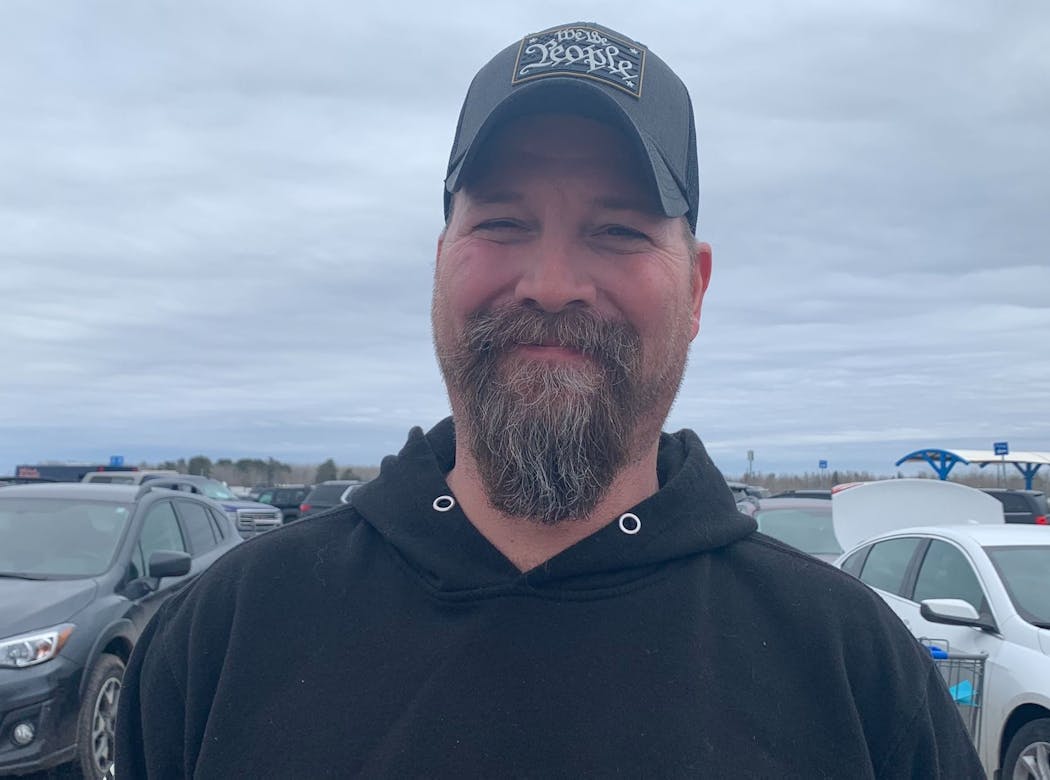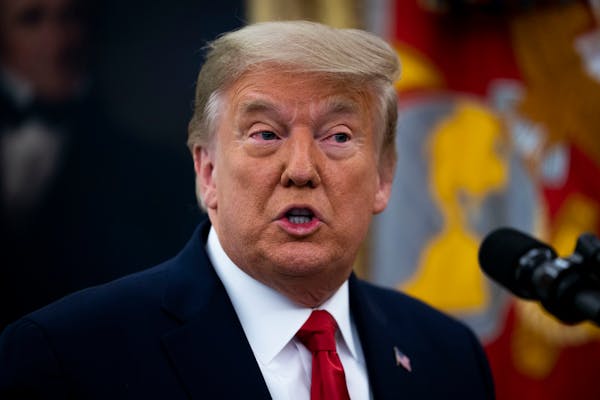Minnesota's already complicated relationship with Donald Trump just got more fraught.
The businessman came closer than any Republican in decades to flipping the state red in 2016. Four years later, he decisively lost his re-election bid in Minnesota to Joe Biden.
Now, as he seeks the presidency in 2024 — freshly mired in a historic criminal indictment — Minnesotans must again confront the question of how they feel about Trump.
"I think he did a lot of stuff he wasn't supposed to be doing," said Hibbing resident Ron Molick, who described himself on Friday as "on the fence" about Trump and the indictment. He's voted for him twice, but doesn't think he would again.
The grand jury's decision didn't change how Jon Bukovich sees Trump. The 45-year-old, who lives outside of Hibbing, said he didn't follow politics until 2016 when he said Trump opened his eyes to political corruption.
Bukovich wasn't surprised by news of the indictment, and he's not worried about it either. He thinks the former president will be found not guilty of wrongdoing and forge ahead.
"They keep trying to hammer Trump and nothing sticks," he said, laughing. "I swear the guy is Teflon."
The Trump question is most immediate for Minnesota Republicans, who voters cast out of power in St. Paul and are trying to find their way back in 2024. The candidate at the top of their ticket next year for president will define the overarching message of the campaign.
"Whenever we're talking about Donald Trump, that really seems to hurt Republicans in Minnesota," said Andy Brehm, an attorney and GOP political operative.
While Brehm said he's worried about the precedent the indictment sets for the criminal justice system, he wants his party to move on from Trump and focus on attacking one-party control and the Democratic agenda at the State Capitol.
"To win elections, we're working really hard to rebrand ourselves. The way we've been selling our ideas hasn't been working," Brehm said. "Continuing to have Trump in the headlines is a distraction from that work."
Hours after the news broke, top Minnesota Republicans largely cast the case as a "politically motivated" attack. Former Minnesota Republican governor candidate Scott Jensen said the indictment will inspire blowback from voters.
"If [Manhattan district attorney] Alvin Bragg and his team want to make a martyr out of President Trump, I think he may rue the day he chose to do that," Jensen said.
Trump's indictment makes Republicans likely to rally to his defense, said Amy Koch, a GOP operative and former state Senate majority leader.
"He wants an enemy, he wants a fight, because in a fight, his people demand allegiance," Koch said. "I think this strengthens him in a very, very strange way."
Republicans have so far only offered broad statements about the indictment, with many saying it raises concerns about fairness in the judicial system. They've avoided commenting on the allegations of hush money payments to adult film star Stormy Daniels at the center of the case. The specific criminal charges against Trump won't be unsealed until he is arraigned, which is expected Tuesday.
For Matt Huschle, chair of the Clearwater County Republicans,Trump's stance against abortion rights is more important than the indictment, citing the former president's appointments of Supreme Court justices who overturned Roe v. Wade.
"That's the most lasting impact for me," Huschle said. "I can see what he has done for the country, and compared to what Biden is doing, it's hands-down Trump."
Former South Carolina Gov. Nikki Haley, a Republican who was U.S. ambassador to the United Nations for part of Trump's presidency, is his main opponent for the GOP nomination so far. Florida Republican Gov. Ron DeSantis is widely expected to run as well and is gaining popularity in the party.
"In the minds of voters, is anybody's calculus on this going to change?" Minnesota conservative talk radio host Jon Justice said on his show Friday. "Individuals who may have been looking at other candidates and waiting for the full field for Republican candidates in 2024 to emerge, they may see this and it might change their calculus."
Chad Heuer, a 49-year-old Shakopee resident who works at Canterbury Park, thinks Democrats and investigators are putting unfair scrutiny on Trump. Heuer said he voted for Trump in 2020 and always votes Republican, but added he plans to vote for a different Republican in 2024 — adding that it's not due to the indictment.
"It's time for a new person to come in," Heuer said.
How this all affects Trump's chances in 2024 could come down to independent-minded voters.
"It's going to depend on the independents and undecided voters and the kind of people who, frankly, don't pay very much attention," said Kevin Parsneau, a political science professor at Minnesota State University Mankato. "What is their gut reaction? What will their impressions be?"
Democratic voters were happy about the indictment news, even if they were far from certain anything would come from it.
Carlos Gomez, a 32-year-old clothes salesman from Shakopee, said that even major public officials should have to suffer the consequences of violating the law. But he didn't think Trump's supporters would abandon him.
"He already has his cult following that will vote for him no matter what," he said.
Kristin Dillon and Alexis Akervik, both Democrats who live in the Twin Cities area, said they were joyous about the indictment when they heard the news Thursday while walking through the Mall of America.
"Two thumbs up. It's great, now let's see him actually go to jail," said Akervik, a graphic designer. "Let's call it a day on this guy."
She was cautious about whether there would be any long-term repercussions for Trump, but she thought Minnesotans might be more willing to reject him after the indictment.
"If any state with GOPers is going to be like, 'You know what? That's enough,' it's going to be here," Akervik said.
Dillon, her companion, was far less confident. Trump, she said, "literally said he could shoot someone on Sixth Avenue and get away with it, and it seems like maybe it's true."
Staff writers Louis Krauss and Ryan Faircloth contributed to this report.
Finding an apartment may be easier for California pet owners under new legislation
Jury selection could be nearing a close in Donald Trump's hush money trial in New York



